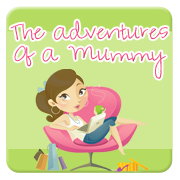And these books caught my eyes :

 I know it's of vast difference in interest, but given my situation - *imagine a screaming mother who throws herself into fits which will subsequently turned into convulsions & a mother who wants to do some culinary in her interest - baking. Of course to make sure her cake turns into a cake and cookies turns into cookies. When it comes to baking I'd rather not have any magic show - imagine a cake turned into kueh bolu. Duh mummy!*
I know it's of vast difference in interest, but given my situation - *imagine a screaming mother who throws herself into fits which will subsequently turned into convulsions & a mother who wants to do some culinary in her interest - baking. Of course to make sure her cake turns into a cake and cookies turns into cookies. When it comes to baking I'd rather not have any magic show - imagine a cake turned into kueh bolu. Duh mummy!*On a personal note, I think the parenting book will give me some solutions and how to enhance my relationship with my 2 children.
extracted from Post Gazette
 Anita Dufalla, Post-Gazette | |
 Respect your child's privacy, providing them with physical and emotional space. Respect your child's privacy, providing them with physical and emotional space. Enforce discipline with consistency. Enforce discipline with consistency. Calm down about the messy room. Beyond a twice-yearly thorough cleaning, let kids set the standard. Calm down about the messy room. Beyond a twice-yearly thorough cleaning, let kids set the standard. Let them struggle; don't be quick to provide solutions. Let them struggle; don't be quick to provide solutions. Don't preach or threaten: Let consequences speak for themselves. Don't preach or threaten: Let consequences speak for themselves. "ScreamFree Parenting: Raising Your Kids by Keeping Your Cool" by Hal Edward Runkel; www.screamfree.com "ScreamFree Parenting: Raising Your Kids by Keeping Your Cool" by Hal Edward Runkel; www.screamfree.com "Loving Without Spoiling & 100 Other Timeless Tips for Raising Terrific Kids" by Nancy Samalin; www.samalin.com "Loving Without Spoiling & 100 Other Timeless Tips for Raising Terrific Kids" by Nancy Samalin; www.samalin.com |
The telephone receptionist's voice is calm and soothing, but her opening greeting is guaranteed to get the caller's attention:
"Scream-free Living, may I help you?"
Welcome to the offices of Hal Edward Runkel, a licensed marriage and family therapist in Atlanta, who is busy working to lower the decibel levels in American family life -- particularly the parenting part.
Author of the 2005 book "ScreamFree Parenting: Raising Your Kids by Keeping Your Cool," Mr. Runkel is tapping into perhaps one of the biggest anxieties that parents face today: a fear they are spending much too much time yelling or screaming at their children -- and worse, to no avail.
In an age when child-rearing advice books number in the thousands, Mr. Runkel has probably hit upon the perfect way to separate himself from the rest of the pack. His cleverly marketed "Scream-free" program has recently expanded beyond the parenting book to include "living", "marriage" and "leadership." There's a Web site, e-mail newsletters, silicon wristbands, seminars, DVD's and a decidedly loyal following of parents who swear his approach works.
Not to mention a huge group of parents -- nearly everyone, it seems -- who yell at their children at one time or another.
A 2003 study of almost 1,000 parents by Dr. Murray A. Straus of the Family Research Laboratory at the University of New Hampshire in Durham, NH, found that nearly all of the survey respondents used what the authors called "psychological aggression" to discipline children by the time they were 5 years old, including yelling and screaming, cursing and swearing, name calling, and threats of spanking. Moreover, nine out of 10 parents said they had used such methods on children aged 2 or younger.
And while corporal punishment is no longer the norm -- only 26 percent of parents of children under 3 years of age spank them, according to a study in the journal Pediatrics -- that same study found that yelling can have some of the same adverse effects on child well-being as spanking.
Mr. Runkel says his secret is to teach the parents to change their behavior first, not their children's.
In short, to chill out.
"The only way to retain a position of control over our children is to regain a position of control over ourselves," he says. "It's about how I can I stay calm and assured even when the kids are pushing my buttons." Mr. Runkel says he teaches parents to ratchet down their emotional "reactivity" and not to try to intervene so much, but rather let the children experience the consequences of their own bad choices.
"Let the consequences do the screaming," he said.
As an example, he cites the single mother of five teenagers whose youngest daughter always wanted her mother to drive her to school each day.
"It was an ordeal. The mother would nag, and yell, and the daughter would stall, and they both ended up late, to school and to work, and the mom just resented the hell out of her daughter."
Mr. Runkel advised the mother to stop reminding her daughter every five minutes that she was going to be late, "because the more you remind her, the less she has to remind herself."
Instead, the mother calmly informed her daughter that she was leaving in 15 minutes and that she would "love" for the daughter to join her. When the girl didn't come down from her room in time, the mother left for work.
"The woman told me she didn't think about her daughter until noon," Mr. Runkel says, "when she got a call from her daughter, who demanded to know what she could have for lunch. When the mother asked why she was home, the daughter said, 'because you left me, mom.' Instead of yelling at her, the mother calmly told her why she had left and said the girl should walk to school and get an unexcused absence."
There was some more complaining, but faced with no alternative, the girl went to school, received a "zero" on a test she had missed -- and stopped being late.
When it comes to the vocal aspects of parenting, Mr. Runkel may be on to something, said Jeff Lawson, director of prevention and education services with Family Links, a local social service agency who works with special needs children in therapeutic situations.
"It's not the first issue that comes up, but after you talk to parents about life in their household, the issue of screaming does arise," said Mr. Lawson.
It is entirely possible, though, that this current generation of parents screams at their children more than their parents did, he and other experts say.
"We're a very results-oriented generation, we want immediate gratification, and we tend to think screaming is the fastest way to get that," Mr. Lawson said. The stresses of every day life, especially in two-income families where time is at a premium, means that screaming has become kind of a short cut to what would have been a more measured attempt at discipline in the past, he added.
It is possible, too, that in previous generations, when child-rearing was more authoritarian and disciplinary tools included spanking, parents had less of a need to raise their voices.
"When our parents screamed, it really meant something," Mr. Lawson said. "When your father raised his voice, chances are he got a response that was immediate because there was going to be a consequence that could have been corporal punishment or something else."
Nancy Samalin, a parent educator and author of the best selling books "Loving Not Spoiling" and "Love and Anger" agrees, although she doesn't necessarily regard the post-World War II authoritarian approach as optimal.
"Perhaps parents today scream more because unlike our parents, they are no longer comfortable using fear as a tactic for controlling kids' behavior," Ms. Samilin said. "What is really fear is often described as 'respect.' When someone says 'I would never dare talk to my parents the way my kids talk to me,' that can be translated as 'I was too scared to talk back to my parents.' "
Indeed, Amy Guest, a 38-year-old mother of four who lives in Ben Avon, has very clear memories of a strict upbringing, where back talk was not permitted.
"You did not mess with my mom and you did not speak to an adult in a certain way," Ms. Guest said, adding that she is trying to emulate her mother's parenting style --which includes firm rules and little, if any, yelling.
"We are a culture of overindulging our kids. We want to be "friends" with our children and we want them to have everything," said Ms. Grant. "I want to have a good relationship with my kids. I don't want to be a sergeant. But I really see that when you set limits and they know what's expected of them, and you follow through on that, they respect you more and love you more."
Still, even the strictest parent is going lose it sometimes, Samalin said.
"Every parent is going to yell at their kids at some point, because children can, quite simply, be incredibly annoying," she said. "But if you're always yelling, he's going to tune you out very quickly."
Ms. Samalin coined a phrase, "mother deaf" to describe the kid who blithely ignores his parent's operatic exhortations. "When my sons were growing up I nagged and yelled as much as the next person," she says, but by forcing herself to change "a little bit," by setting boundaries in a positive, non-accusatory manner, she was able to turn the volume down "and my sons turned out surprisingly well."
There are different kinds of yelling, experts say. The most acceptable form is the "warning" yell, to prevent a child from crossing the street, for example. More commonplace is the yelling that occurs when the child refuses to obey an order. The least acceptable? Hurtful yelling, when the parent says things he or she may later regret.
"No one likes to scream at their children, but we do," said Mr. Lawson, of Family Links. "But what is the underlying reason behind it? If you raise your voice to your children, do you step back and talk about what happened?"
Planning ahead is a good way to avoid yelling or screaming, Mr. Lawson tells parents. A child who is informed that he will be staying home with his parents for a "family night" watching a DVD when he had hoped to play basketball with a neighbor may balk, leading to a shouting match.
"But if you give him plenty of notice, then both of you are on the same page, and you can avoid a stressful situation," he said.
Ms. Guest says she doesn't yell at her children very much. Working from parenting advisor John Rosemond's playbook, she dealt with her 2-year old-daughter's habit of getting out of bed and into hers over and over again not by yelling but by calmly taking the child back to her own room -- amid loud protests, to be sure.
"After several nights of this, she realized, 'Mom's not going to cave,' and it worked," she said. "You need to mean what you say."
It was tougher, a few years later, when Ms. Guest had to tell her 4-year-old that because of some serious misbehavior she would not be permitted to attend a much-anticipated pre-school "beach party."
"It was the hardest thing. She was so upset by that. I can't tell you, though, how doing that one thing, really changed her behavior. It showed I mean business."
And Ms. Guest did it all without screaming, once.
"I'm more partial to the Vulcan grip to the head and speaking through clenched teeth," she laughs.




No comments:
Post a Comment